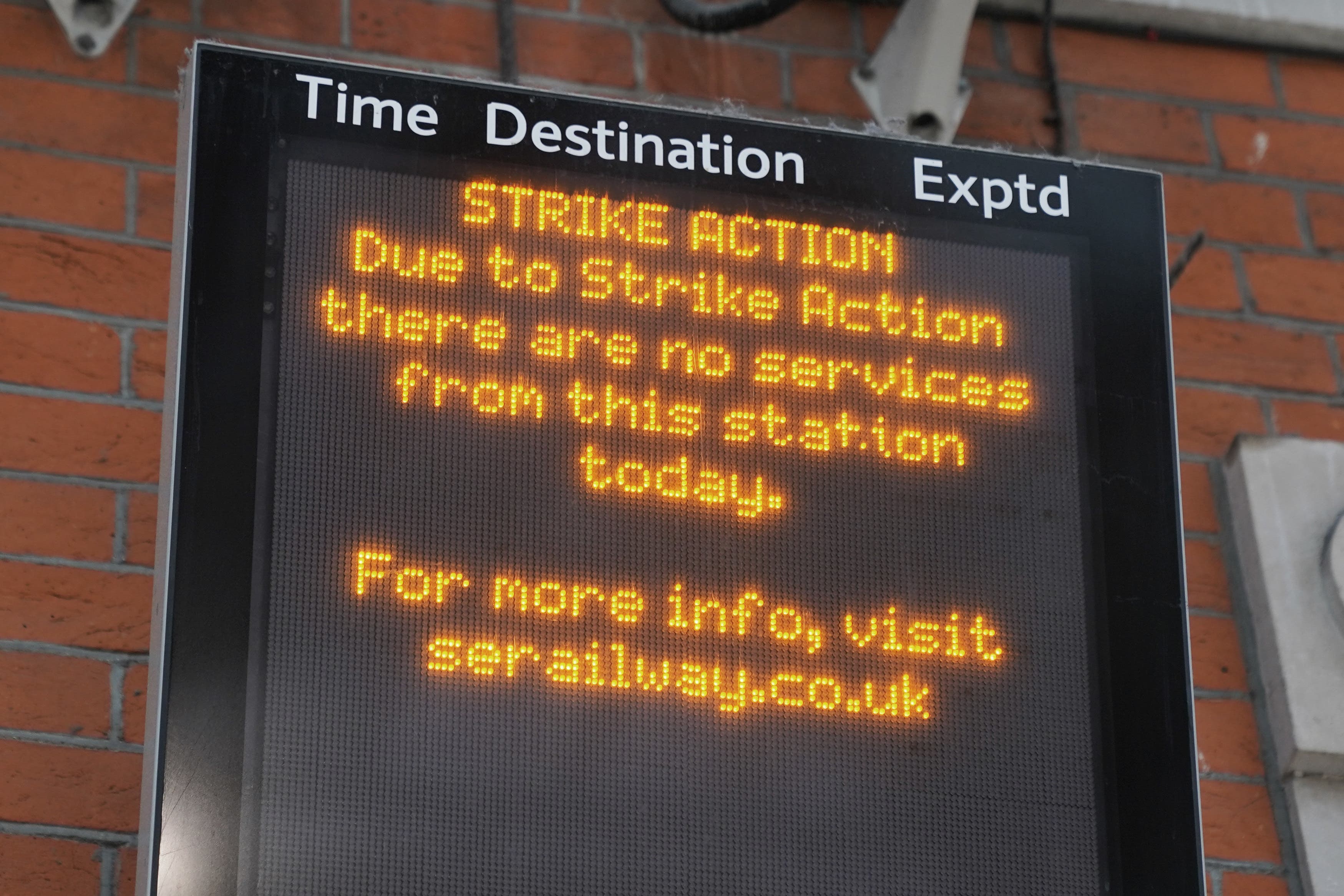Prime minister accused of ‘playing games’ as rail strike continues
None of the operators hit by strikes used new regulations aimed at ensuring a minimum level of service during industrial action

Your support helps us to tell the story
From reproductive rights to climate change to Big Tech, The Independent is on the ground when the story is developing. Whether it's investigating the financials of Elon Musk's pro-Trump PAC or producing our latest documentary, 'The A Word', which shines a light on the American women fighting for reproductive rights, we know how important it is to parse out the facts from the messaging.
At such a critical moment in US history, we need reporters on the ground. Your donation allows us to keep sending journalists to speak to both sides of the story.
The Independent is trusted by Americans across the entire political spectrum. And unlike many other quality news outlets, we choose not to lock Americans out of our reporting and analysis with paywalls. We believe quality journalism should be available to everyone, paid for by those who can afford it.
Your support makes all the difference.The prime minister has been accused of “playing games” rather than trying to help resolve the long-running train drivers’ dispute as another strike caused travel disruption across parts of England.
Members of Aslef on some of the busiest commuter routes, including many into London, walked out on Tuesday, crippling services on operators such as Southern, SouthEastern, Gatwick Express and South Western Railway.
Some areas had no trains all day, forcing many people onto the roads, leading to huge traffic jams in parts of the country.
Train drivers at Northern Trains and the TransPennine Express are striking today (31 January) as part of a rolling programme of action until early next week in a bitter row over pay and conditions.
None of the operators hit by strikes used new regulations aimed at ensuring a minimum level of service during industrial action.
Read more: January, February and March train strike dates – everything you need to know about rail disruption
Downing Street said it will consider if they can “strengthen” minimum service level (MSL) rules after train operators opted not to use the new law during strikes.
The Prime Minister’s official spokesman said: “This is something that the rail companies have asked for and we have delivered it for them.
“We believe they should be ready to use the legislation to reduce the impact of rail strikes on passengers, but we are always open to looking at how we can strengthen the rules around MSLs to ensure they deliver for the best interests of passengers. That’s something we will continue to look at and of course we will keep discussing with the rail companies themselves.”
Sources told the PA news agency that rail companies had not asked for the regulations amid warnings from unions and opposition politicians that they were unworkable.
TUC general secretary Paul Nowak told PA: “This is a desperate attempt to distract from the Government’s failings. Employers from rail to health warned months ago these new laws are unworkable and would escalate industrial tensions.
“The PM should stop playing games and help resolve this dispute.”
A spokesperson for Rail Delivery Group, said: “Minimum Service Level legislation is one of many useful tools for managing strike disruption, but it is not a silver bullet.
“Operators’ guiding principle is always to make sure they can offer the best, most reliable services possible for their passengers on and around industrial action days, and to do that they need to make careful assessments of their own particular operational circumstances before deciding the best way forward.”
Meanwhile, the Rail, Maritime and Transport union (RMT) announced a strike by London Overground workers in a separate dispute over pay.
More than 300 union members will walk out for 48 hours on 19 February and again on 4 March.
Security, station, revenue and control staff are among those taking industrial action.
Aslef says it has not met with Transport Secretary Mark Harper for more than a year despite a series of strikes which have caused travel misery and cost industries such as hospitality tens of millions of pounds in lost business.
A Department of Transport spokesperson said on Monday: “Aslef’s leadership is refusing to let their members vote on an offer that would see the average train driver’s salary increase to £65,000.
“The Transport Secretary and Rail Minister have already facilitated talks that led to this fair and reasonable offer from industry – Aslef bosses should put it to their members so we can resolve the dispute, which has already happened with the RMT, TSSA and Unite unions.
“With passenger revenues not having recovered since the pandemic, the taxpayer has had to prop up the railways with £12 billion in the past year alone – these strikes will not change the need for urgent workplace reforms that Aslef continue to block.”
It is understood that rail industry sources do not recognise the idea that the Government was asked to bring forward these new laws.
But the rail industry did engage throughout the process of the legislation being drafted.
Join our commenting forum
Join thought-provoking conversations, follow other Independent readers and see their replies
Comments